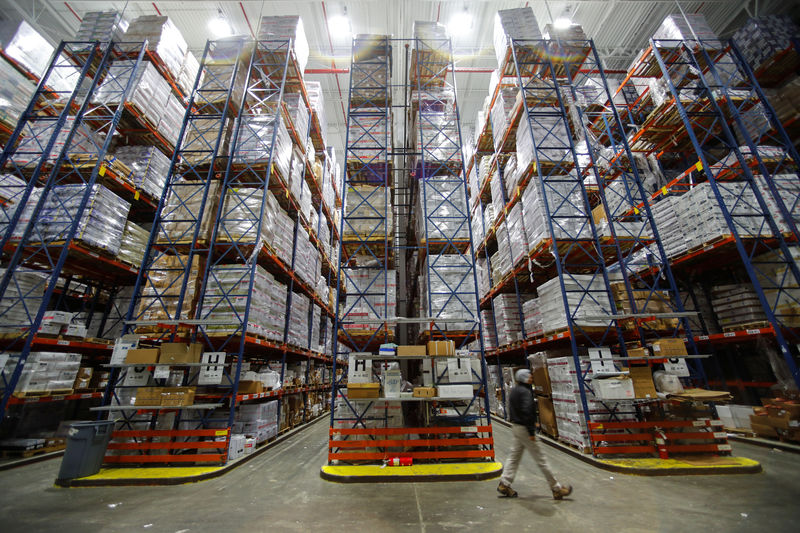By Rajesh Kumar Singh
CHICAGO (Reuters) - With U.S. President Donald Trump's announcement on Thursday of tariffs on another $300 billion of Chinese imports, nearly all goods from China will be subject to import taxes, and Trump says they generate billions of dollars in revenues for the U.S. Treasury from China.
But that is not how tariffs work. China's government and companies in China do not pay U.S. tariffs directly. Tariffs are a tax on imported products and are paid by U.S.-registered firms to U.S. customs when goods enter the United States.
Importers often pass the costs of tariffs on to customers - manufacturers and consumers in the United States - by raising their prices. U.S. business executives and economists say U.S. consumers foot much of the tariff bill.
That was why, immediately after Trump announced his decision, U.S. retailers blasted the move as "another tax increase on American businesses and consumers," which they warned would threaten U.S. jobs and raise costs for American families.
The new levies will hit a wide swath of consumer goods from cell phones and laptop computers to toys and footwear.
Stephen Lamar, executive vice president of the American Apparel & Footwear Association, said the new tariffs would hit U.S. consumers far harder than Chinese manufacturers, who produce 42% of apparel and 69% of footwear purchased in the United States.
Investors are worried that the increase in retail prices will hit consumer spending which has underpinned the U.S. economy, and trade uncertainty makes businesses hold back capital spending.
WHAT THE 'TARIFF MAN' SAYS
Trump says the United States will be "taxing" China until a trade deal is secured. He has called himself the "Tariff Man," often repeating that China pays for U.S. tariffs on its goods.
On May 5, he tweeted: "For 10 months, China has been paying Tariffs to the USA."
HOW TARIFFS REALLY WORK
U.S. Customs and Border Protection (CBP) collects the tax on imports. The agency typically requires importers to pay duties within 10 days of their shipments clearing customs.
From early 2018 through May 1, Washington has assessed $23.7 billion in tariffs, according to data from the CBP.
Total tariff revenue rose by 73% year-on-year in the first half of 2019, to a total of $33.9 billion, according to U.S. Treasury data.
DO CHINESE SUPPLIERS BEAR THE COSTS OF U.S. TARIFFS?
Chinese suppliers do shoulder some of the cost of U.S. tariffs in indirect ways. Exporters sometimes, for instance, may offer U.S. importers a discount to help defray the costs of higher U.S. duties and maintain their contracts and market share.
Chinese companies are losing business as U.S. importers are scouting for cheaper, tariff-free sources of the same goods outside China.
Trump and top members of his Cabinet have said that the tariffs are accelerating a move of manufacturing out of China as companies seek to relocate in countries that are not subject to U.S. import tariffs.
U.S.-based importers, meanwhile, are managing the higher tax burden in a number of ways that hurt U.S. companies and customers more than China.
Such strategies include accepting lower profit margins; cutting costs - including wages and jobs for U.S. workers; deferring any potential wage hikes, in addition to passing on tariff costs through higher prices for U.S. consumers or companies.
Most importers use a mix of such tactics to spread the higher costs among suppliers and consumers or buyers.
HIGHER PRICES FOR COMPANIES AND CONSUMERS
Higher duties on imports of Chinese and other products, for example, increased Caterpillar (NYSE:CAT) Inc's production costs by $70 million in the last quarter. It expects to pay between $250 million and $350 million in tariffs this year. In response to higher manufacturing costs, the heavy equipment maker has increased prices.
Walmart (NYSE:WMT) Inc, the world's largest retailer, and department store chain Macy's Inc have warned of an increase in prices for shoppers due to higher tariffs on goods from China.
A Congressional Research Service report in February found that tariffs imposed by Trump on global washing machine imports had boosted prices by as much as 12%, compared with January 2018, before tariffs took effect.
Global steel and aluminum import tariffs increased the price of steel products by nearly 9% last year, pushing up costs for steel users by $5.6 billion, according to a study by the Peterson Institute for International Economics.
U.S. companies and consumers paid $3 billion a month in additional taxes because of tariffs on Chinese goods and on global metals imports, according to a study by the Federal Reserve Bank of New York, Princeton University, and Columbia University. Companies shouldered an additional $1.4 billion in costs related to lost efficiency in 2018, the study found.
WHAT DO COMPANIES IN CHINA PAY?
China has retaliated against U.S. tariffs by imposing its own tariffs on imports from the United States.
Most importers in China are Chinese. So in the same way the U.S. government collects import taxes on Chinese goods from U.S. importers, the Chinese government takes in taxes on U.S. goods from Chinese importers.
